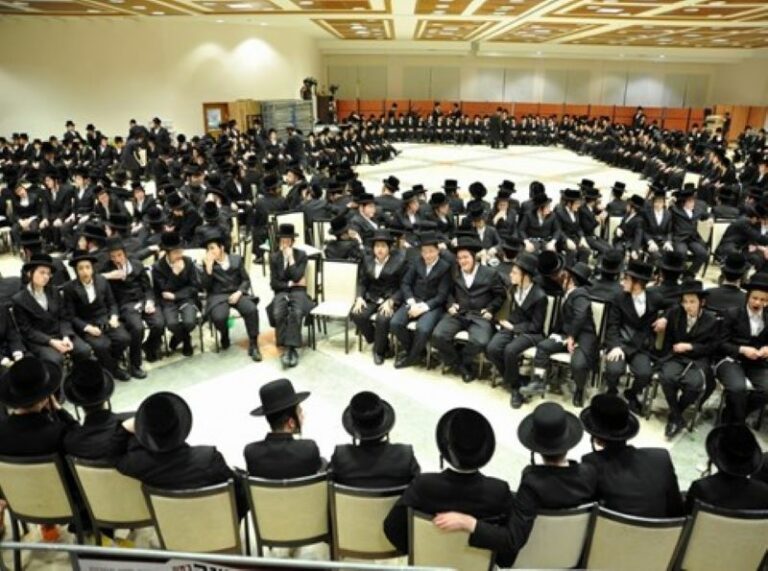The Vizhnitzer Rebbe, who visited the US last week, spoke out against the “general” Chassidish yeshivos who expel bochurim who get engaged at the age of 18.
Speaking at a gathering together with his cousin, the Vizhnitzer Rebbe of Monsey, the Rebbe expressed his pain on the matter. “In past generations, they married at a very young age. Nowadays not as much but nevertheless, I have grievances against several yeshivos that forbid their talmidim from getting married during Shiur Beis even if the bochur is already 18, and they only allow them to get engaged after Shavuos of Shiur Beis. This is the minhag in several yeshivos, even in ones that operate according to Chassidish minhagim.”
“In my view, this is incorrect. I’ve said more than once that it’s incorrect to make such a takanah in the yeshivos because it’s contrary to our Torah HaKedoshah.”

“I raise the issue but not everyone agrees to accept it. There are yeshivos where it’s forbidden to speak about shidduchim before the age of 20. My father, z’tl, (the Yeshuos Moshe) would respond severely – when bochurim who were already 18 would come to him, he would exhort them to hurry and not delay shidduchim. Yeshivos who act in the ruach of chassidus that push off shidduchim until after age 18 is a severe matter.”
The Vizhniter Rebbe of Monsey responded: “The yeshivos that are manhig like this present it as a precondition from the start.”
Vizhnitzer Rebbe: “According to the stipulation, if the bochur becomes involved with a shidduch before Shavuos, he has to leave yeshivah. This matter pains me. When they come to me to ask about a shidduch for a bochur who’s 17.5, and the bochur is ready, I say that he can get engaged. But it’s true that before the age of 18, I don’t push because our generation is not like the previous ones.”
Vizhnitzer Rebbe of Monday: “For this reason, it might be appropriate to do the opposite, to start even earlier than what was customary in the past.”
Vizhnitzer Rebbe: “Therefore it pains me so much that in some Chassidish yeshivos, if they find out that a bochur got engaged prior to the stipulated time according to the regulations, the chasan must leave the yeshivah – do you have an eitzah on the matter?”
Vizhnitzer Rebbe of Monsey: “It’s not my inyan to sort out everything happening in the world.”
Vizhnitzer Rebbe: “I didn’t discuss it with the Roshei Yeshivos but I already told the Vizhnitzer chassidim who are involved in chinuch in these yeshivos that they can convey in my name that this regulation is against halacha. If I had the chance to discuss this with the heads of the yeshivos, I would tell them my opinion.”
Vizhnitzer Rebbe of Monsey. “Their taina is that the yeshivah is weakened as a result.”
Vizhnitzer Rebbe: “It’s possible to take care of the matter in various ways. Your late father, z’tl (the Toras Mordechai) would certainly not have agreed to such a regulation. Is it shayach to enact a regulation that is neged halacha for any reason?”
The Rebbe’s son-in-law, HaRav Menachem Mendel Hagar, then interjected that a bochur once told HaGaon HaRav Chaim Kanievsky, z’tl that he was accepted to two yeshivos – one where the bochurim learn with great hasmadah but the yeshivah has a rule that bochurim can’t get engaged until a certain age, and the second yeshivah which has no rules about shidduchim but the hasmada of the bochurim wasn’t as good.
HaRav Chaim, z’tl, responded that the bochur should go to the yeshivah where the hasmadah was excellent and he could still get engaged at a young age since the regulation falls into the category of a ‘מתנה על מה שכתוב בתורה’ [a condition that contradicts what is written in the Torah] that has no significance.
(YWN Israel Desk – Jerusalem)











17 Responses
{1} Rambam, Hilchot Deot, Chapter 3, Paragraph 1:
The Sages commanded that a man should not forbid himself things, except for those things that are forbidden by the Torah.
=============================
{2} Vilna Gaon commentary on Mishlei, chapter 22, verse 28:
Do not create new fences for the paths of GD.
=============================
{3} You should not be overly strict in any observance.
Excessive strictness is the advice of the Evil Urge.
It makes a person fear that he has not done things just right and thus brings him into a state of depression. Depression is the greatest obstacle to serving G-d.
SOURCE: The Baal Shem Tov, quoted in Tzava’ath HaRivash, page 221, quoted by Sefer Baal Shem Tov, Bereshith 145.
=============================
{4} “Chassidus [piety] does NOT mean the pursuit of every possible stringency.”
SOURCE: The Life and Teachings of Rabbi Eliyahu the Gaon of Vilna (page 57) by Betzalel Landau, translated by Yonasan Rosenblum, year 1994 CE, Mesorah Publications.
=============================
{5} Rabbi Nathan Zvi Finkel, the Alter of Slabodka (born year 1849 CE, died year 1927 CE) had a student who accepted Shabbat two hours early every week. When Rabbi Finkel discovered that his student viewed ordinary Jews as Shabbat desecrators because they were not on the same level as he was, Rabbi Finkel instructed his student to discontinue his practice.
SOURCE: Community Magazine, 2008 May, article titled: Overcoming Intolerance by Rabbi Eli Mansour, page 24.
It’s not just Rav Chaim ztz”l, it’s already the Chazon Ish ztz”l. See Ma’aseh Ish (vol. 2 p. 290, vol. 2 p. 207).
Saddik who is not afraid of being truthful. Yashar Koach
I hope the Lakewood Freezer culprits are reading this incredibly important article
two people who are not the sharpest people around having a conversation, I think I heard deeper conversations in the basement of shomer shabbos between a couple homeless people as to the best place to get free food.
Vizhnitzer Rebbe of Monday!! What does the Vizhnitzer rebbe of Tuesday say about it?
> Rambam, Hilchot Deot, Chapter 3, Paragraph 1: The Sages commanded that a man should not forbid himself things, except for those things that are forbidden by the Torah.
Read on to chapter 5, 11: (yes, I know, this is not the final word in halakha, but if you quote the sefer …)
The way of sensible men is that first, one should establish an occupation by which he can support himself. Then, he should purchase a house to live in and then, marry a wife. [This order of priorities may be inferred from Deuteronomy 20:5-7], which states: “Who is the man who has planted a vineyard, but not redeemed it…;” “who is the man who has built a house, but not dedicated it…;” “who is the man who has betrothed a woman, but not taken her [to wife]…”
In contrast, a fool begins by marrying a wife. Then, if he can find the means, he purchases a house. Finally, towards the e
There’s only a maximum age everyone’s Halachicly required to be married by. There’s no minimum age that you can’t Halachicly marry before.
the Vizhnitzer Rebbe is completely correct!
commonsaychel: I think it a very positive turn of events that a prominent Torah personage supports marrying off our children young. I have been an outlier in my community for years in my support of this idea.
Speaking plainly, the Vizhnitzer Rebbe wishes to keep our children far from sin. This is what Rebbe Nachman zt”l taught as well. To delay marriage is to open up the youth to all manner of temptation.
Marrying young was one of the ways our People remained distinct and holy throughout our exile.
“i have been an outlier in my community for years in my support of this idea of [marrying off children young].
Ari: In some communities, its called child abuse rather than an “outlier”. If you really believe that pushing children to marry “young” is a great idea, you either may live in Kentucky with your 14 YO second cousin or should expect a visit from your local Office of Child Protective Services
Gadol: Not quite that young. I was referring to the idea of marrying at 18. But thanks for the comment.
You get married when you can support yourself. How many of these 18 year old chatanim come thru my shule seeking funds? Many. How many fathers come thru seeking funds for a child getting married? Many. Ask these gentlemen if they work, and they look at you as if you have three heads.
He’s right.
So many chachamim
So many pesokim
It feels like Rabbe Akiva Students. Educated, have sources, BUT WHAT A SINAS CHINAM.
Ah!!!!
In the US the youngest one can marry is dependent on the state. There is no minimum age by law in CA MI MS NM RI SC SD WA WV WY; in some of these states parental approval is enough in some judicial approval is needed. in NY and NJ, minors cannot marry legally.
@Ari Knobler
Maybe allowing children to mature, see the world a bit and gain some life experience before deciding who they want to live with for the rest of their lives isn’t such a terrible idea though. Maybe the concept of restraining temptation is inhumane and unnatural.